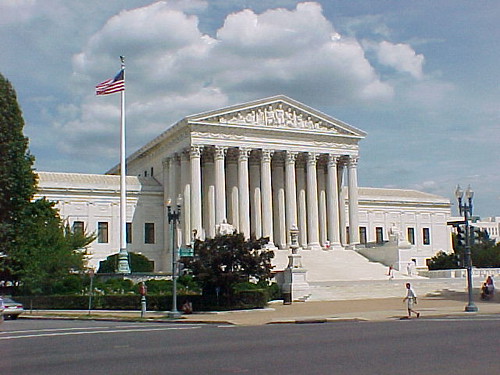Key Takeaways:
• A new petition challenges marriage equality, aiming to shield Kim Davis from damages.
• Kim Davis refuses same-sex marriage licenses, citing her religious beliefs.
• Justice Alito’s comments hint he may want to revisit marriage equality.
• Legal experts doubt the court will erase the Obergefell ruling.
• The case focuses on personal liability, not directly on marriage equality itself.
Can Marriage Equality Be Overturned?
The Supreme Court is now weighing a case that tests the strength of marriage equality. A former county clerk, Kim Davis, refused to issue licenses to same-sex couples. She defended her choice by claiming her religion protected her actions. A jury disagreed and ordered her to pay $100,000 in damages. Davis served six days in jail after defying the high court’s earlier ruling.
Earlier this year, Davis asked the justices to take her case. She argued that forcing her to pay damages violated her right to freely exercise her religion. Moreover, she called the landmark marriage equality ruling “egregiously wrong.” Despite her claims, legal experts think the court will avoid undoing marriage equality.
Marriage Equality and the Kim Davis Stand
Kim Davis gained national attention when she refused to follow the Supreme Court’s decision. Her stance sparked protests nationwide. Many viewed her actions as a direct challenge to the principle of equal treatment under the law. After the ruling, two same-sex couples sued Davis. They won in federal court and recovered damages. Davis’s new petition seeks to erase that financial penalty.
Davis’s petition doesn’t ask the court to revisit marriage equality directly. Instead, it focuses on her personal liability. Yet, she labels Obergefell, the case that guaranteed same-sex marriage, as a grave mistake. She claims her religious beliefs shield her from any penalty. Critics call her move cynical. They say she aims to raise money by drawing attention to her cause.
What Justice Alito Really Thinks About Marriage Equality
During a recent conference, Justice Samuel Alito made comments that puzzled many observers. He said he wasn’t pushing to overturn past decisions. Yet, experts note his earlier writings suggest he’d rule against marriage equality if given the choice. One commentator pointed out that Alito likely stepped back to avoid a media firestorm. Still, his underlying view may be different.
Legal experts on a televised news show questioned whether the court would take up Davis’s petition. They think the justices see it as a sidestep of the real issue: whether they want to revisit marriage equality. A former clerk remarked that the petition seems aimed at escaping the $100,000 damages. He added that the court probably won’t want to reward that tactic.
Will Marriage Equality Precedent Survive?
Many lawyers doubt the court will grant Davis’s petition. They think the justices will see it as a one-off case about damages, not marriage equality. Even so, the worry lingers: if the court hears the case, could it use Davis’s petition as a backdoor to challenge marriage equality?
Experiences from past terms show the court is cautious about reopening settled questions. Overturning a landmark decision can shake public confidence. It also sends a message about the court’s stability. Therefore, asking to undo marriage equality through a case about personal damages seems unlikely to succeed.
What Comes Next?
If the Supreme Court declines to hear the petition, the lower court’s ruling stands. Davis remains responsible for the damages. Moreover, marriage equality remains intact. However, if the court does hear the case, arguments will center on religious freedom versus equal protection. Such a showdown could spark another national debate.
Supporters of marriage equality warn that any hint of revisiting the decision sows uncertainty. They stress that same-sex couples rely on stable legal protections. Opponents argue that religious beliefs deserve stronger safeguards. They say forcing a person to act against conscience raises free-exercise concerns.
In the end, the justices must decide whether to use this case to clarify religious rights or to reopen the marriage equality debate. Many expect them to choose the narrower path. After all, the petition focuses on personal liability, not the core issue of marriage rights.
Why This Matters
Marriage equality stands as one of the most significant civil-rights victories in recent history. It affirmed that all couples deserve equal treatment under the law. Any threat to that decision could affect many areas of public life. From wedding ceremonies to hospital visits, the Obergefell ruling has far-reaching impact.
A Supreme Court that appears willing to reconsider such a major ruling could unsettle millions. While today’s petition targets one person’s damages, it raises a broader question: how stable are our rights once a landmark case is decided? Critics warn that allowing one petition to chip away at precedent sets a dangerous example.
In simple terms, this case tests whether a single clerk’s fight can shake decades of progress. For now, most experts believe the court will avoid that outcome. Yet the hearing itself highlights the ongoing clash between religious freedom and equal treatment.
Frequently Asked Questions
What does Kim Davis want from the Supreme Court?
She wants the court to erase the $100,000 in damages she owes. She claims her religious beliefs protect her actions.
Does this case directly challenge marriage equality?
Not really. The petition focuses on personal liability for Davis, not the broader marriage equality ruling.
Could the Supreme Court use this case to overturn marriage equality?
Legally it’s possible, but experts doubt the court will reopen that landmark decision over this narrow petition.
What happens if the court denies the petition?
The lower court’s ruling stays in place. Davis remains responsible for the fines, and marriage equality stays intact.
